Like, I had some opinions about how the way Game of Thrones ended. But I also am like, I could not imagine landing that plane that was on fire, that was that show.
Miles Luna
Maybe so, Miles. Or maybe you should give yourself more credit.
Here at the Fandomentals, we’ve made it no secret our…complex feelings towards Game of Thrones. Whether it be the series’ misogynistic undertones, complete and utter failure in adapting the source material, or the show losing any sense of narrative cohesion, Game of Thrones may be the single greatest example of crashing and burning in television history.
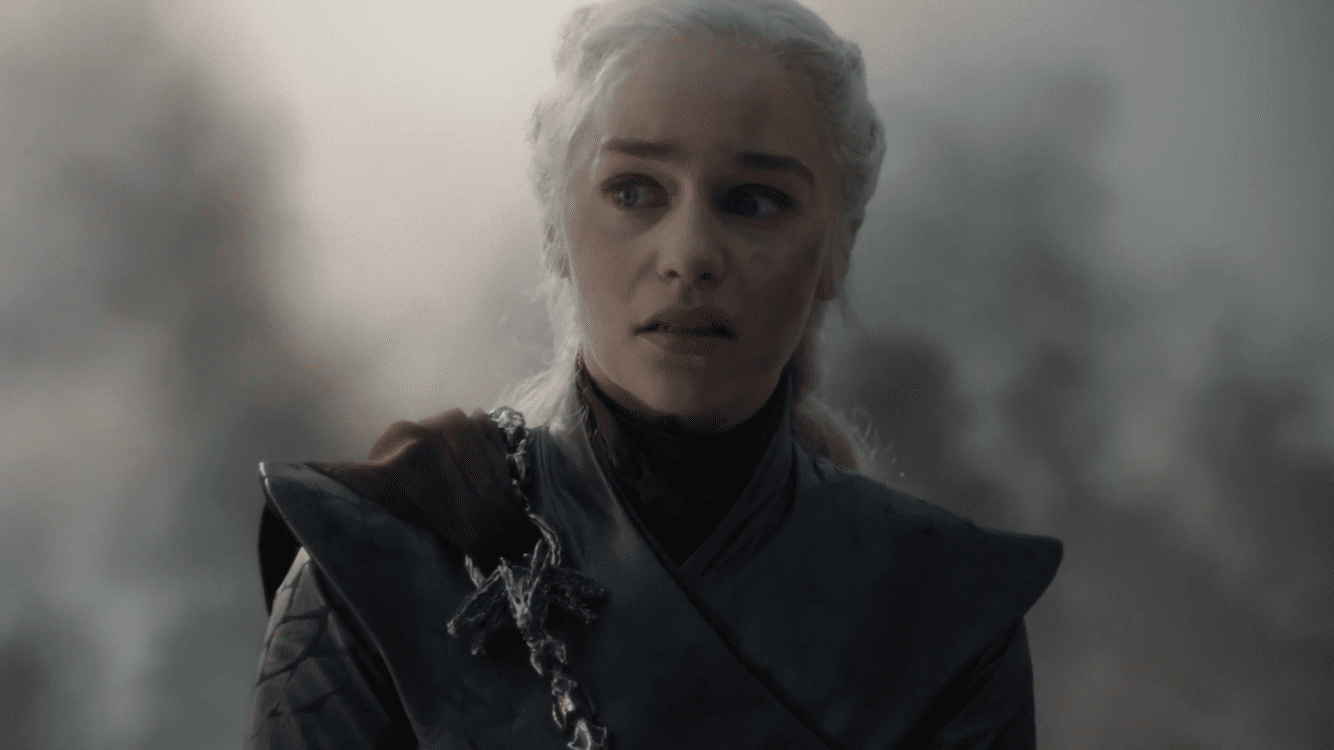
While there’s a plethora of issues with the show that I could examine, today I’m going to focus on just one: Daenerys Targaryen. Daenerys’ transformation from hero to villain was one of the most heavily criticized aspects of the last season of Game of Thrones, and understandably so. Though I could see the writers clearly trying to show how her numerous personal tragedies and strategic setbacks were wearing her down, there was nothing that convinced me that Daenerys would incinerate helpless civilians.
She may have been ruthless from time to time, but this was barbaric, illogical, and completely out of character. While the show has had a lot of characters act in ways that are completely incongruous to their established identities, I found that this was the one that well and truly ‘broke’ whatever semblance of a narrative remained at that point.
Now I could go on all day the many, many issues I have with Daenerys and the way the writers have treated her. However, my colleague Jess has already written a comprehensive article on why ‘The Bells’ failed Daenerys, so I’d like to try something different. Because if there’s one thing that we at the Fandomentals love talking about as much as the various failings of Game of Thrones, it’s about how animated media – particularly children’s television – in recent years has consistently delivered complex narratives with well-crafted characters, messages and themes.
Some prime examples include Steven Universe, Avatar: The Last Airbender, and its sequel The Legend of Korra. From abusive relationships to genocide to fascism, these shows have handled these complex issues in a far more respectful manner than Game of Thrones, to the point people have created things like this;
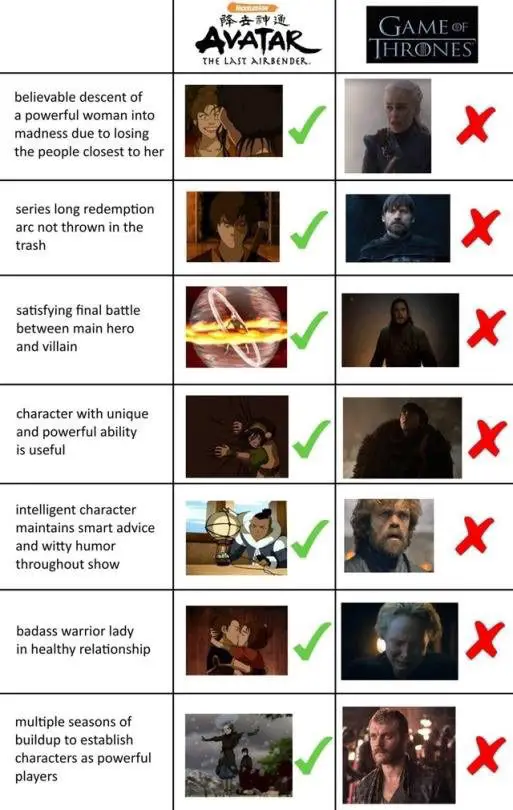
So, for this article, I thought I’d add another show to the roster of animated media outdoing Game of Thrones: RWBY. Now, I should make a couple of things clear. RWBY is not a children’s show, by any stretch of the animation. The show’s creators been very clear about this, so much so that halfway through Volume 3 they posted a public service announcement informing the audience – particularly those who watched with young children – that the series was going to be going in a darker direction.
That’s not to say ATLA, Korra and Steven Universe don’t have darker elements. While I’m not as familiar with the latter series, I remember watching ‘Alone at Sea’ and thinking, “they put this in a kid’s show?!”
Then there’s ATLA and Korra, which cover pretty much every sociological issue under the sun. Imperialism, inequality, mental trauma…I could go on all day. However, I do want to draw the distinction between these shows and RWBY. While these shows may be some of the most well-written social commentaries I’ve ever watched dressed up as children’s television, they are just that; shows for kids. They are bound by certain rules in what they can show – such as LGBTQ representation – that RWBY isn’t, which does give the creators a lot more flexibility in what they depict.
The other thing that I want to make clear is that while RWBY is one of my favourite shows of all time, it is by no means perfect. I may love it to bits, but I’ll also be the first to admit that RWBY has a lot of flaws. The lack of a review for Volumes 7&8 on this site are largely in part to me having very conflicting feelings about their quality. Although the storytelling has generally improved as the series has progressed, I don’t hold RWBY up to the level of say, ATLA and Korra. However, while there’s a lot that I could critique about Volumes 7&8, there was one aspect that I found the show did…well, perfectly.
And that is the transformation of General James Ironwood from hero to villain.
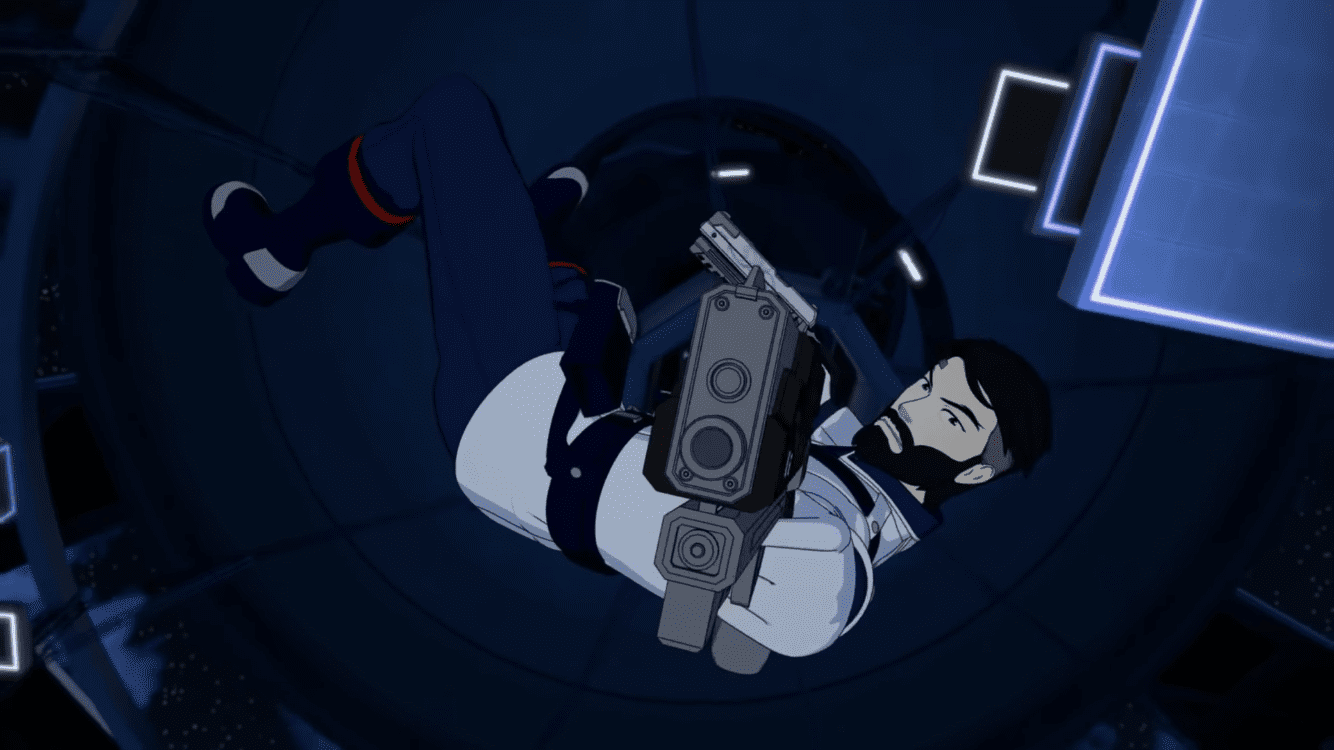
Right from his introduction in Volume 2, Ironwood has been one of my favourite characters in all of RWBY. Courageous but bull-headed, compassionate yet occasionally ruthless, Ironwood’s multi-faceted nature has made him one of the most compelling characters in the show. A great number of Ironwood’s scenes featured him and the other adult characters – Ozpin, Glynda, Qrow – discussing the darker elements of the plot. As his character introduction coincided with the storytelling of RWBY becoming more mature, it became very easy to directly associate Ironwood with these changes. To put it simply; Ironwood symbolised that the show was growing up.
Now, I fully expected Ironwood to turn bad during the Atlas portion of the story. The groundwork had already been laid – more on that later – and in my opinion it was a matter of when, not if he would turn against Ruby and company. However, I wasn’t really expecting anything particularly impressive storytelling-wise. As I mentioned earlier, I don’t have incredibly high expectations of RWBY. While Volume 6 was an enormous improvement, after Volume 5 my faith in the series had been somewhat shaken. So, going in I expected the heroes would spend Volume 7 tiptoeing around an ultra-paranoid Ironwood, who would eventually snap and turn against them.
What I did not expect was a meticulously crafted transformation of a flawed, well-intentioned man into a ruthless dictator. The show took the time and effort to make Ironwood’s fall from grace believable, and made his actions as a villain understandable. In short, everything Daenerys’ arc wasn’t. And seeing how these transformations both occurred in the seventh and eight seasons of their characters respective series [1], and how close said series aired to one another [2], I decided what better way to show well Ironwood’s arc was executed, by comparing it to how poorly Daenerys’ was. To do this, I’ll be breaking these arcs down into three parts, starting with;
Part 1: Laying the Foundation
Having an established heroic character change to a villainous one in a believable way is something that is incredibly difficult to pull off. While it may be the inverse of a redemption arc, it poses the same challenges – how do you convince the audience to look past the character’s previous actions and accept their new self? The longer the character acts one way, whether heroic or villainous, the harder it is going to be to accept that they are genuinely be a different person now.
One way to help sell the authenticity of this transformation is to establish from the very introduction of a character a trait that, taken to the extreme, could lead them to changing sides. After all, it’s much easier to accept a villain’s actions if they have the same motivations that they did as a hero.
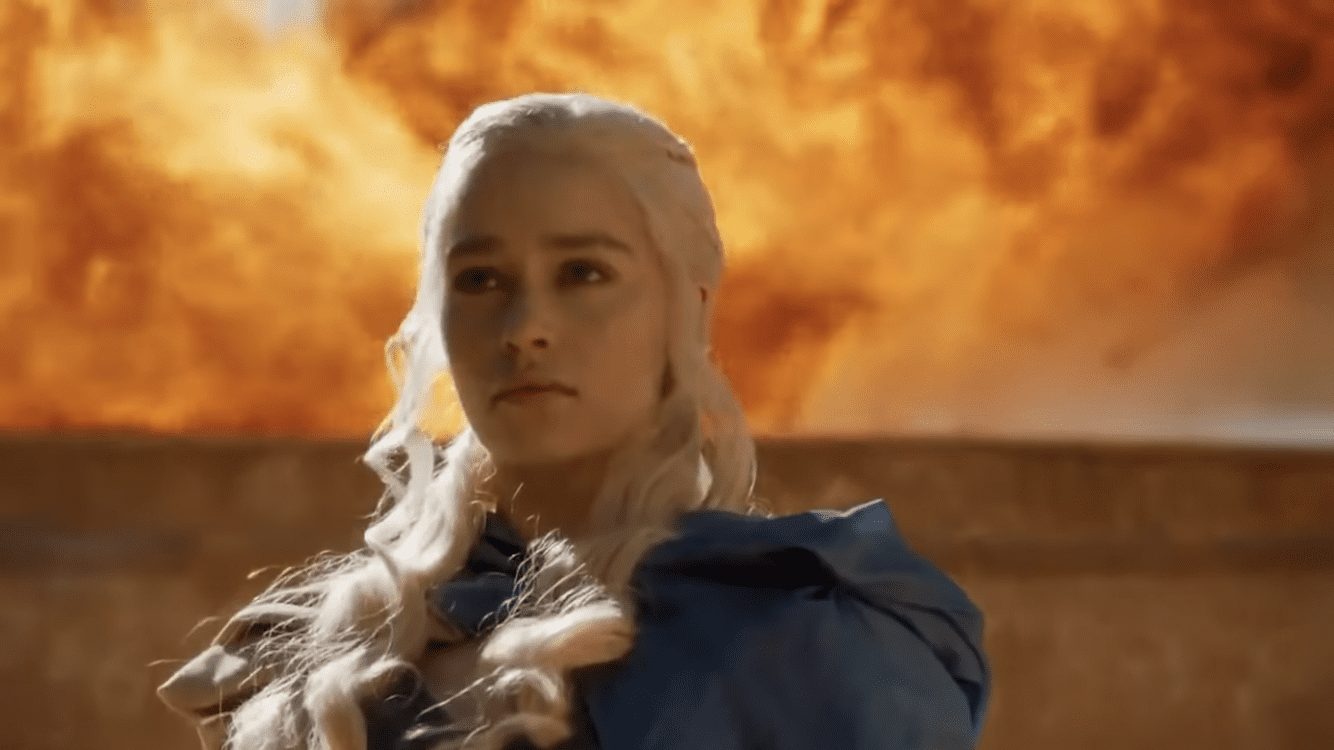
And this is something that GoT actually did well with Daenerys. Even all the way back in season one, Daenerys has shown a degree of ruthlessness when she’s trying to get what she wants. While it doesn’t come out straight away, it’s still clearly there; she consents to the murder of her own brother, and has Mirri Maz Duur tied to her funeral pyre and incinerated. And it doesn’t stop there. She locks Xaro Xhoan Daxon and one of her own handmaids, Doreah, in a vault and leaves them to die. She tricks Astapor into giving her an army of Unsullied, then uses it to slaughter the Good Masters. She crucifies one hundred and sixty-three Great Masters, and uses them as markers on the road to Meereen.
Now, it’s not that these actions were done with no reason. The people who Daenerys had killed had committed atrocities; Viserys regularly threatened and abused her, Mirri Maz Duur poisoned her husband and killed her baby, Xaro and Doreah betrayed her, the Good Masters created the Unsullied by castrating slave boys and putting them through training so brutal only one in four survived, and the Great Masters crucified children. These were, by no stretch of the imagination, good people. Daenerys may be a hero, but she’s got more in common with the Punisher than say, Wonder Woman.
At the end of the day, while I never doubted that she had benevolent goals, it was always clear that her form of justice lived up to her House’s words. When push came to shove, Daenerys was brutal, ruthless, and dealt out justice with fire and blood. She was by no means a perfect individual, and the first four seasons laid out her flaws for the audience to see. While she was ultimately portrayed as the hero for the majority of the series, she clearly possessed characteristics that would have made her a great villain had her character arc been treated properly…but more on that later.
Now when it comes to Ironwood, one of his defining character traits right from his very introduction was his willingness to do whatever it took to protect the world. He goes behind Ozpin’s back to have Atlas put in charge of security for the Vytal Festival. He conducts experiments to build technology that will allow the transfer of Aura, which, while not really having an equivalent in our world, is something other characters find deeply unethical. And then there’s the implication that he’s perfectly willing to torture Roman to get information from him. All of this, coupled with his bullheadedness and tendency to not think through the consequences of his actions, are what made him such an interesting character.
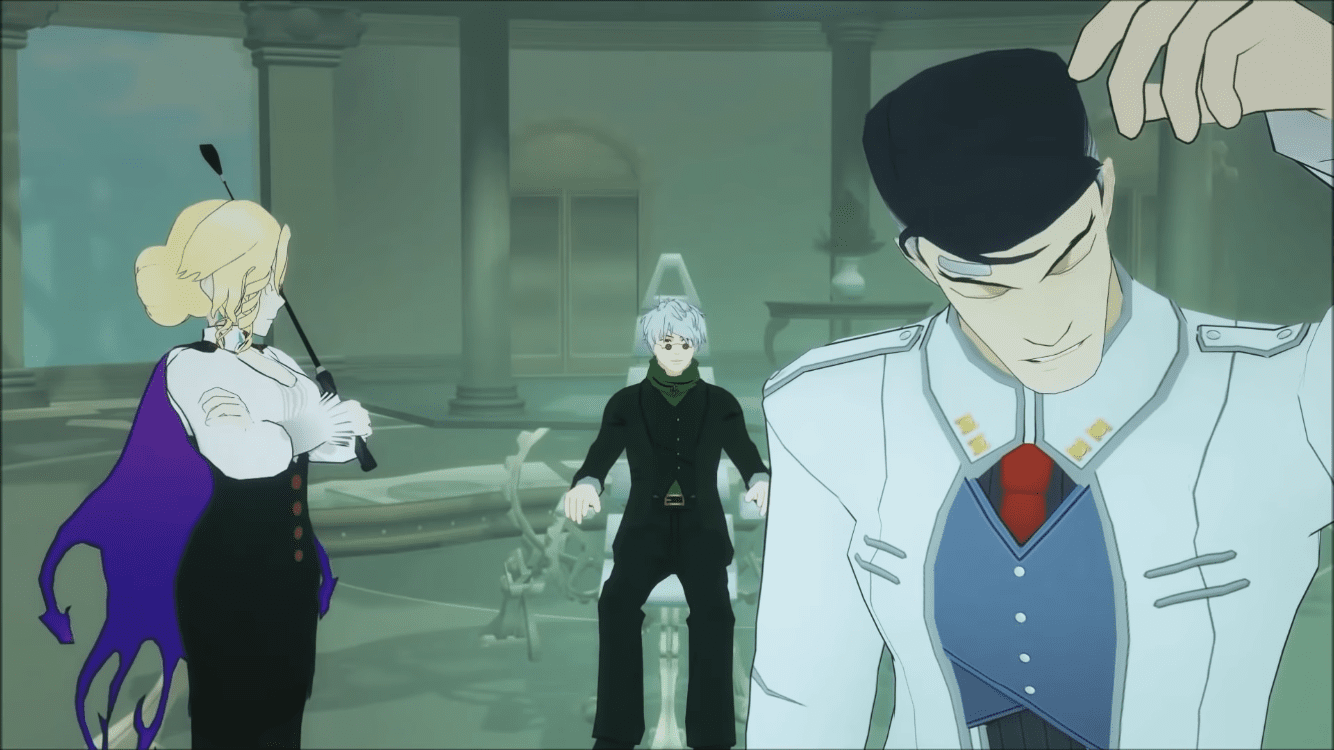
Much like Daenerys, Ironwood had reasons behind his actions. He went behind Ozpin’s back because he felt like Ozpin’s secretive approach to the threat of Salem wasn’t working, and he thought he could do a better job at protecting the people of Vale. His Aura experiments, while unethical, were to ensure Salem didn’t get her hands on the power of the Fall Maiden. And as far as torturing Roman goes, the man clearly had some ties to Salem and her associates, and any information that could help in the fight against them could potentially save the lives of millions.
I’m not trying to let either of these characters off the hook for their actions, nor am I trying to portray them solely through their worst aspects. Yes, Daenerys was ruthless and brutal when the situation called for it – but she was trying to upend an oppressive system of slavery that had lasted for millennia! At the end of the day, what she wanted to do was help people. The same can be said for Ironwood. While he was perfectly willing to cross ethical lines, it was for the purpose of saving the world from Salem. For all his flaws, he was trying to be a hero.
Part 2: The Build-up
While GoT and RWBY were both very successful in laying the groundwork for their heroes turning to the dark side, the latter series distinguished itself from the former was how it transitioned from these foundations into a believable character arc. This what I mean by the ‘build up’ – RWBY gradually set up the idea that Ironwood was going to turn evil across Volumes 4 through 6, so that it felt like a natural part of his character’s growth when it eventually happened.
This is an admittedly tricky process. After all, when a character is introduced as a hero, the audience expects them to remain a hero. Changing that expectation takes time. The more prominent and heroic the character is, the harder it’s going to be to convince the audience that they could potentially become a villain.
There are, of course, some shortcuts. It’s much easier to swallow the idea that a hero is going to switch sides when the audience already knows it going to happen, which is why flashbacks and prequels have an easier job in this department. An obvious example comes in RWBY’s main antagonist; Salem. In The Lost Fable, Salem is introduced as a kind and loving individual, a far cry from the woman who wants to end the world shown throughout the series. However, as she is the series’ Big Bad, it’s no surprise to see her more antagonistic tendencies emerge throughout the episode; her cunning and ability to manipulate others, her anger towards Ozma/Ozpin…even if The Lost Fable wasn’t a meticulously crafted twenty-six-minute character study, it had one foot in the door already.
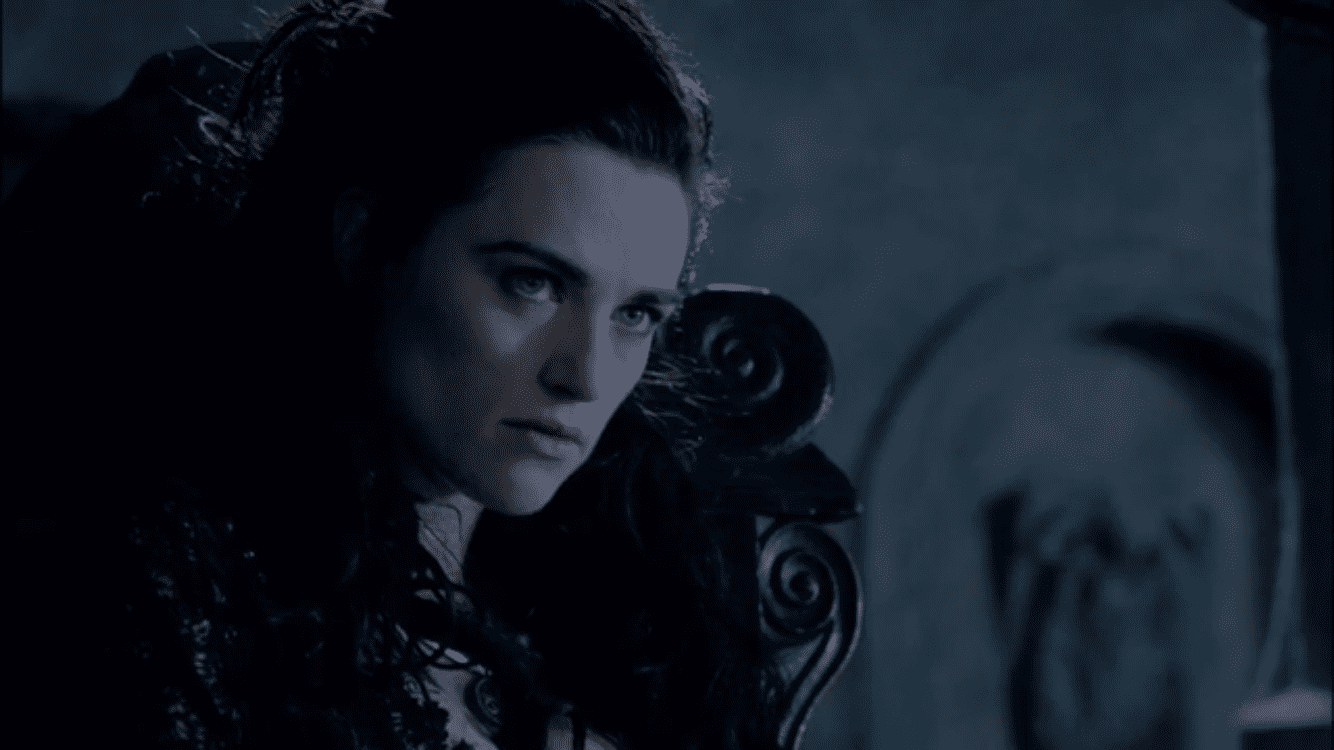
Another way to do this is to draw from an established mythology. Even if it’s a new spin on an old tale, it still has the advantage of the audience expecting the hero to turn. One example of this is Morgana from Merlin. When she’s introduced, she’s strong-willed and unafraid to speak her mind, but is still a fundamentally good person. However, at the end of the day she is still based on one of the major antagonists of the Arthurian legendarium. While how evil she is varies across interpretations, that potential for her to turn against the heroes was always there, so when it finally did happen, it wasn’t completely unexpected.
This is what I believe the showrunners were trying to do with Daenerys. It’s established that Targaryens have a history of mental instability – the last monarch of the dynasty was called the Mad King, after all, and I will concede that there is evidence of Daenerys going down this path in the books. Throughout A Dance with Dragons, Daenerys is pushed to her limit, and her final chapter suggests she may just give up on diplomacy and tackle her problems in a much more violent manner.
However, I’m not here to talk about the books. I’m here to talk about the show, and what went wrong with Daenerys’ arc. Yes, the show laid a very solid foundation for her to go full Mad Queen, but it didn’t go anywhere. Her character flaws weren’t actively explored, and up until the end of season six, she’s painted as a hero. A hero who needs a little guiding from time to time by Saint Tyrion, but a hero nonetheless. The notion of her being anything else is never even considered, even when her actions could’ve easily been portrayed as a hint towards a villainous turn. Her forcing Hizdahr into marriage, her burning down a sacred landmark of the Dothraki…there was room there to gradually seed the idea of Daenerys becoming a villain, but it’s not until season seven that anything is really suggested.
I will admit that season seven does make some effort to hint at Daenerys turning evil, but after six seasons of her being the hero, it feels too little, too late. Had more time been spent in previous seasons discussing her flaws as well as Targaryen madness, then her Tyrion and Varys’ discomfort at her brutality would’ve held more weight. But because no one – not even Tyrion – had questioned Daenerys’ brutality previously, it feels shoehorned, not the natural progression of her character arc. And that’s not even getting into the fact that when Daenerys is slaughtering Foreign People, it’s Bold and Empowering, but when she’s killing white people, it’s suddenly problematic. At the end of the day, had D&D spent more time highlighting Daenerys’ flaws throughout the show, they might’ve actually had a chance at making her fall to darkness believable.
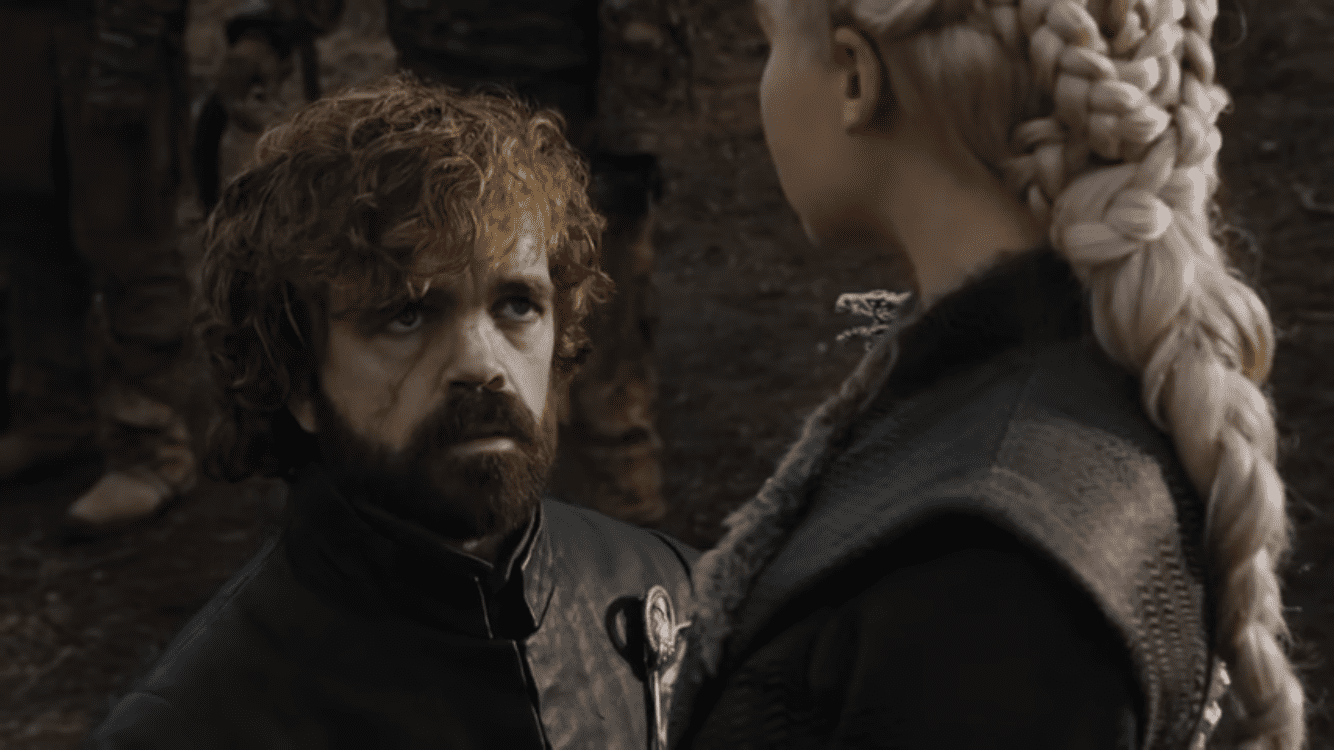
The best way I can illustrate how Daenerys’ turn should’ve been done is to look at Ironwood, and how the show actively built up to him becoming an antagonist. Unlike what GoT did with Daenerys, RWBY actively built upon Ironwood’s established flaws. For example, in Volumes two and three, it’s shown on numerous occasions that Ironwood doesn’t always think through the optics of his actions. In a meeting of Ozpin’s group, Ozpin makes a great point;
“A Guardian is a symbol of comfort, but an army is a symbol of conflict. There’s an energy in the air now, a question in the back of everyone’s minds. If this is the size of our defences, what is it we’re expecting to fight?”
Thus, Ironwood imposing an embargo, then later shutting Atlas’ borders, feels like a natural progression for his character. Ironwood cares about doing what’s right, not what looks right. He even outright says in Volume seven that he doesn’t care about his public image, which is an extremely risky worldview to have when it was Atlas’ forces that the whole world saw go rogue at the Vytal Festival.
This is what sets Ironwood apart from Daenerys – his flaws are actively explored in the story towards their logical endpoint. When Ironwood, who showed throughout Volumes two and three that he struggled to trust people, responds to Jacques’ comment that he’s never trusted anyone but himself with, “AND FOR GOOD REASON!”, it’s a believable progression of his character towards something darker.
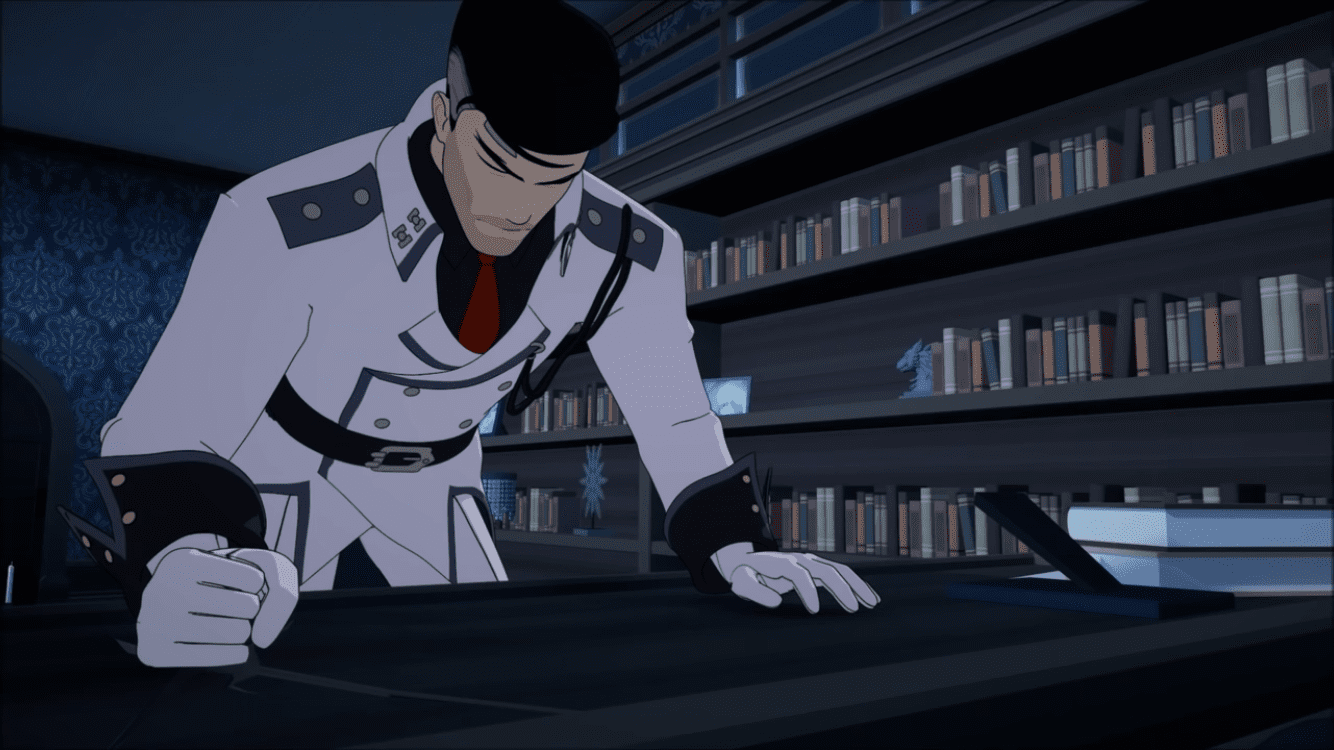
And what sells this is that he’s barely on screen. The audience doesn’t know what Ironwood’s thinking. He’s in Volume four, but the last time we see him is the abovementioned conversation with Jacques, where he’s acting paranoid. We don’t see him again until Volume seven, during which time we only hear about his actions. This is brilliant because it gives the audience to wonder about Ironwood. He has trust issues and has shut off the borders – tell-tale signs of paranoia. For over two years, the fandom was left to wonder what exactly was going on with Ironwood. The show displayed his flaws, and gave the audience time to ruminate, to theorize.
This is what sets Ironwood apart from Daenerys. Even before he truly fell to the dark, his story had progressed in a manner so that it felt like the logical next step. It’s why I expected him to turn against the heroes, and found it so much easier to accept it when it happened. But as for how it happened…well, anything less than a full article would be a disservice to the absolutely stellar writing behind his character arc.
To be continued in part two.
Footnotes
[1]: In fairness, these were the final two seasons of GoT, while RWBY has at least one more confirmed Volume yet to be released.
[2]
GoT Season 7: July – August 2017
GoT Season 8: April – May 2019
RWBY Volume 7: November 2019 – February 2020
RWBY Volume 8: November 2020 – March 2021
Images courtesy of RoosterTeeth Productions, HBO, Cartoon Network, and the BBC
Have strong thoughts about this piece you need to share? Or maybe there’s something else on your mind you’re wanting to talk about with fellow Fandomentals? Head on over to our Community server to join in the conversation!

